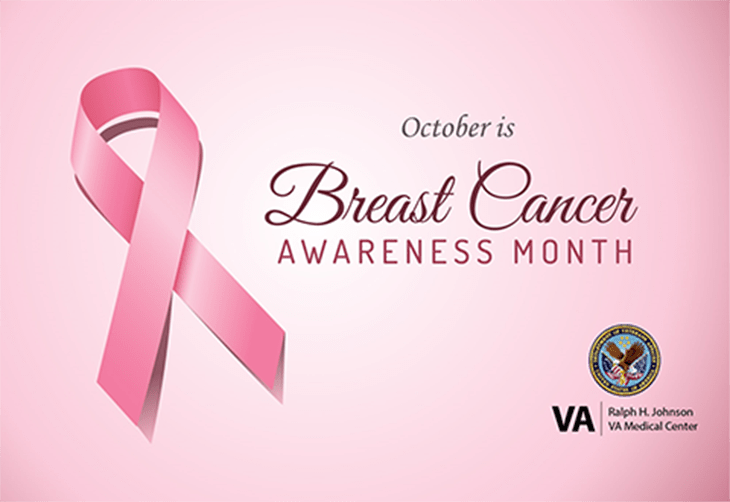This article was originally posted on the Ralph H. Johnson VA Medical Center’s website.
An experience like surviving breast cancer has the potential to truly affect one’s outlook on life and how they decide to direct their future.
When U.S. Army Veteran Jan Shriner was diagnosed with breast cancer two weeks before her 40th birthday, she couldn’t have foreseen that 12 years later she would be working at the Ralph H. Johnson VA Medical Center, helping fellow Veterans as the Cancer Program coordinator.
Initial diagnosis
With a prominent family history of cancer, Shriner was a strong self-advocate to begin her mammograms early at the age of 35. Four years later, during her monthly self-breast exam, Shriner felt a lump in her left breast. She scheduled an appointment for a follow-up mammogram and ultrasound right away. The ultrasound results were so compelling that a pathologist was called in right away and did an on-site biopsy.

It was the dreaded call. It was cancer.
At the time, Shriner was in U.S. Army Reserves and an employee at the VA Palo Alto Health Care System.
“The toughest thing was knowing that I was 39, not partnered and not in a relationship—chemo affects your fertility for life and I knew at this point that I’d probably never have a child,” said Shriner.
Shriner turned 40 on Oct.12 that year and went in for surgery 17 days later.
Shriner recounts the day of her surgery and having her best friend and her son show up to support her. Her friend’s son was young at the time and wearing a green Chinese dragon costume that brightened the tough day. Interventional radiologists typically perform their pre-surgery procedure in the IR suite, but when he saw Shriner’s support system, he opted to do the procedure right in her hospital room. That little green dragon stayed on her belly, comforting her, all the way to the operating room door.
The surgery went well, indicating a very early stage of breast cancer (T1, M0, N0), but the margins still were not clear. The Friday after Thanksgiving, Shriner had her second surgery to ensure narrow margins.
Continuing care
Shriner is an avid outdoorswoman and has long participated in giant slalom and slalom ski racing. After a long and thoughtful discussion with her medical oncologist, Shriner opted to forego conventional chemotherapy, due in part to not wanting to miss her upcoming race season and a scheduled trip to Austria. Instead, she opted for a clinical trial with Zoladex over systemic chemotherapy. Her University of California San Francisco (UCSF) oncologists reported that participating in chemo instead of the trial only would only increase her long-term survival rate by one percent over 10 years.
The following February, she began 35 cycles of radiation and two years of the Zoladex trial.
“As someone who has always been very athletic, one of the hardest parts for me was the overnight chemical menopause and the associated weight gain. As a result of the medication, I gained 40 pounds between November and February. All the sudden I couldn’t get my ski pants on to race,” said Shriner.
The effects of the breast cancer treatment were tougher for Shriner than the actual breast cancer itself. The infertility, the weight gain and even the unflattering post-surgical bras took an emotional toll during the days, months and years following her initial diagnosis.
For 10 years after her surgery, Shriner received regular follow-up care at UCSF. She continues to conduct her monthly self-breast exams and schedules her recommended mammograms. This year, Shriner is celebrating 12 years cancer-free.
The move to Charleston
After more than 20 years as an advanced practice nurse in cardio-thoracic and otolaryngology surgery at VA Palo Alto, Shriner was looking to relocate closer to her family on the east coast.
After a search lasting six months, Shriner applied for a position at Charleston VAMC as the cancer program coordinator. On Dec. 30, 2015, she got the call that would move her across the country.
Shriner is the first long-term cancer program coordinator at Charleston VAMC and is motivated to succeed in her new position. While she is not involved in direct patient care, the facility-wide strategic program planning that she facilitates contributes to how the cancer program is run at the medical center. She assists with the delivery of cancer care in an integrated health care system, helping to ensure that nothing falls through the cracks for these Veterans cancer care.
“I plan to build this program and retire from this facility,” said Shriner, demonstrating her professional and personal passion for Veterans, the VA and cancer care.
In June 2016, Shriner retired from the U.S. Army as a Colonel, fulfilling five years of active duty service and 25 years in the Reserve. She describes herself as “having a Soldier’s heart.”
Shriner is also a patient at the Charleston VAMC and receives her primary care services at the Goose Creek VA Outpatient Clinic.
“I choose to get my care here because I believe in this health care system. If I don’t trust my own system as a cancer survivor how can I ask those Veterans I’m helping to get their care here? I trust my providers and I trust VA health care.”
A lifelong career as a public servant and soldier, along with being a cancer survivor and VA health care consumer, allows Shiner to add a unique perspective to the Charleston VAMC cancer program.
To learn more about breast cancer awareness, visit the VA women’s health care website.
Topics in this story
More Stories
The 2024 National Veteran Suicide Prevention Annual Report provides the foundation for VA’s suicide prevention programs and initiatives.
Theranostics is a specialized field of nuclear medicine that uses a two-pronged approach to diagnose and treat cancer.
Air Force Veteran Shireta Jones overcomes obstacles with support from VA and adaptive devices to continue her passion for pickleball.






